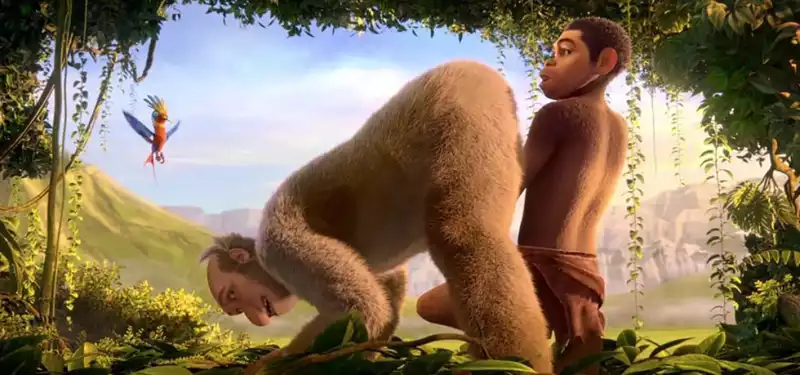Oct 16, 2015
"Animal Kingdom: Let's Go to the Monkey" is one of the most expensive cartoon train accidents in France 1.
With hundreds of animated features being produced annually around the globe, there will inevitably be some cartoon horror shows that pop up out of nowhere with little fanfare. Take, for instance, Animal Kingdom: Let's Go Ape, which Signature Entertainment will debut next Friday in Vue Cinemas throughout the UK.
Details are sparse, but it appears to be a French production funded primarily by Pathé. Although some of the animation was set up in France, the motion capture animation was done by India's Prana Studios, which also animates Disney films like Planes and Tinker Bell:Legend of the Neverbeast.
The film has some known names behind it: French actor Jamel Debbouze (Amélie, Days of Glory) directed the film, and Didier Brunner (Ernest & Celestine, The Secret of Kells, The Triplets of Belleville) lent his name as an associate producer. It appears that the project began with good intentions, adapted from Roy English's cult 1960 novel Evolution Man, Or, How I Ate My Father, which was also the film's original French title before the producers realized that you can't distribute a family film to English-speaking audiences with that title.
There's so many poor creative decisions packed into the two trailers above that you almost want to watch the film just to see how bad it gets. According to the only review I've found so far, it gets worse. For starters, the main character - an outcast son of a primate king - keeps one of his hands inside of his loincloth throughout the entire film. The decision is not entirely without reason: some years ago the actor Debbouze lost the use of his right arm in a train accident and commonly hides it. Since he was the film's mo-cap lead, it was necessary to find a solution. Again, good intentions, questionable execution - especially for a film that was intended to be distributed globally where no one is familiar with Debbouze's personal history.
What's noticeable about the film is that despite its evident awfulness, the visuals have an unusually high level of polish. According to French reports, the film's budget ballooned throughout the production and eventually ended up being in the range of US$40-50 million, which would make it the 15th most expensive film produced in France since 2006. By contrast, the brilliant experimental French animated feature Adama that I wrote about yesterday was made for under US$5 million.
While Animal Kingdom will be a money-loser for Pathé and the film's other backers, it should be noted that the film performed respectably in its home territory of France, earning $13.6 million when it was released earlier this spring.




Post your comment